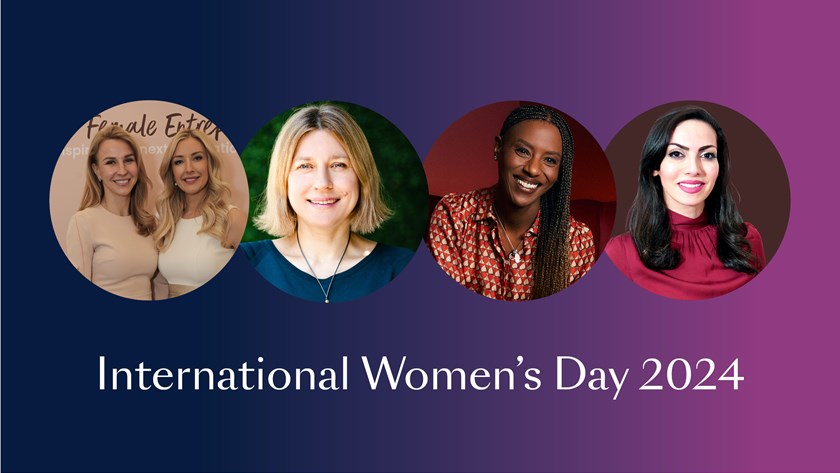Female entrepreneurs: an insider’s outlook on breaking barriers and meaning business
Insight

Being an entrepreneur is no mean feat regardless of gender, but being a woman potentially makes the journey to owning a successful and sustainable business even more difficult. Last year’s Rose Review highlighted some frightening statistics: only one in three UK entrepreneurs are women, female-led businesses are on average only 44 per cent of the size of male-led businesses in terms of economic contribution, and male SMEs are five times more likely to scale up to £1m turnover than their female counterparts.
With such figures in mind, Marija Butkovic, founder and CEO of Women of Wearables (WoW), Kirstie Sherriff, co-founder of organic skincare companies Pinks Boutique and Proverb Skin, Celia Pool, co-founder of DAME, a personal care brand that launched the world’s first reusable tampon applicator, and Yvonne Bajela, an investor at Impact X, shared some of their insider advice on how female owners can break down barriers in what is traditionally a male-dominated business world.
Defying expectations
The unfortunate reality of unconscious bias, as our brains risk rapidly making stereotypical judgments about others, could unfairly lead to questions about a female founder’s credibility, trustworthiness or knowledge, whether manifesting itself in investors asking about women’s family plans, or a customer insisting that their male counterpart would do a better job. Yet Celia and Yvonne both value the power of identity.
"Staying true to who you are as a woman and not toning down your feminine view of the world is vital, as then you are bringing your own dimension and insight. But ultimately respecting yourself is first and foremost."
Celia Pool, co-founder of DAME
"As women we have a unique and powerful perspective to offer in the world of entrepreneurship, despite the obstacles and stereotypes we often may face. We have to walk in that power with confidence and not fear, whilst also preserving a positive sense of self, irrespective of the challenges that may come our way."
Yvonne Bajela, an investor at Impact X
Accessing funding
A British Business Bank report states that for every £1 of venture capital investment in the UK, all-female founder teams get less than 1p, whilst all-male teams get a whopping 89p. Gender is therefore a real obstacle for female entrepreneurs seeking investment, and although female investors may be more likely to invest in female founders, according to Diversity VC, just 13 per cent of senior people on UK investment teams are women, and almost half of investment teams have no women at all. Therefore, unsurprisingly for Celia, "the rise of more neutral channels such as crowdfunding is a positive sign".
In light of this, Yvonne recommends "initiating conversations with investors who may be interested in your company before you actually fundraise. There is significantly less pressure for all parties that way and often investors are open to have a conversation and provide advice."
But in relation to businesses like WoW that are specifically tailored towards women, for Marija “many male VC’s don’t understand why there’s a need for it and so for such female-centric businesses you must hand-hold and really explain the business well to investors". And as female founders often don’t ask investors for enough money, "women need to ask for more but also need real figures to back such requests".
Kirstie on the other hand "had no doubt [she] could be a female CEO, as an inordinate number of women own businesses in the beauty industry and often the girls started it and the husbands end up working in it". Yet a significant barrier for female entrepreneurs is that start-ups are often deeply rooted in all-male networks, so when Kirstie and her husband, Luke (co-founder of both brands), brainstormed contacts for outside investment, "[her] list was nothing in comparison…the majority of what happened in [their] investment round was because of Luke and his rugby and school network". Which leads to the importance of…
Building a network
HSBC Private Banking’s report on female entrepreneurship, She’s the Business, reinforced the need to improve female founders’ access to networks, as having a robust support network is paramount to securing entrepreneurial success.
"You need to start with people who you know and get them to understand the business. Go to everything you’re invited to and don’t be afraid to ask for help or be afraid of how successful that person you’re asking may be. They have nothing to prove or lose and so may take real pleasure in helping. But remember it’s a two-way street, so always think of something you can offer in return, no matter how small."
Kirstie Sherriff, co-founder of Pinks Boutique and Proverb Skin
"When it comes to building a network, it does require a level of patience as it takes time to build genuine relationships. Where there is a networking opportunity, we can often feel pressured to come across in a certain way, however, be yourself. I have been able to develop some incredible long-term friendships and personal mentors as a result of putting myself out there networking, being myself and having organic conversations."
Yvonne Bajela, co-founder of DAME
Juggling a work-life balance
According to the Rose Review, women are twice as likely as men to mention family responsibilities as a barrier to starting a business, and for female entrepreneurs with children, primary care responsibilities are the number one barrier to further business success.
"There is always going to be some degree that you’re failing on one side or the other – you could be a much better businesswoman without children and a much better mum without the business. So, you have to give a lot of mental focus as to why you are doing it, and then be willing to love that about yourself."
Kirstie Sherriff, co-founder of Pinks Boutique and Proverb Skin
"It’s all about juggling as best as you can and when you are present, you are present, and when you are with your children, you’re with your children, but ultimately as an entrepreneur you have freedom and flexibility."
Marija Butkovic, founder and CEO of Women of Wearables
"Here’s where acceptance comes into play. Acceptance that you are not going to be a supermum, that your children may arrive at school without their PE kit every now and then (in my case every week) or that you will have to push back this investor call to later, so you can attend the school play. Balance means making choices and prioritising and being okay with the fact that you will never get it totally right."
Celia Pool, co-founder of DAME
"I’m a big fan of delegating so if that means you need to hire a part time nanny or a cleaner to free up your time, do what you have to do to focus on your priorities."
Yvonne Bajela, an investor at Impact X
Conquering confidence
Research undertaken by Natwest indicates that almost two thirds of would-be female entrepreneurs blame self-confidence as preventing them from pursuing their dreams. It’s therefore not necessarily an entirely external glass ceiling but sometimes an internal one that gets in the way.
"Having a mentor or a coach can really help develop confidence and it is something I have found very useful throughout my career. I also think it’s really important that female founders find a tribe, as a sense of community can be really empowering. Being an entrepreneur can be a lonely journey and being able to share experiences and ideas on how to overcome challenges can give you the confidence and reassurance needed at those times when it is needed the most."
Yvonne Bajela, an investor at Impact X
Marija, Kirstie and Celia all recommend regularly writing down your successes, no matter how small, and Kirstie suggests "setting new things to do each week, so if you’d normally only say one thing in a board meeting, challenge yourself to say two". Marija also recognises that asking for feedback can really help to boost your confidence.
And finally, Kirstie, who has recently been producing hand sanitiser in light of COVID-19, believes it is perhaps resilience as opposed to confidence that is critical: "you need to understand it’s a journey - successful people are the people who cling on the hardest", with Marija agreeing "even if you fail…you’ll pick yourself up and continue – that’s not the worst thing that can happen".
Many thanks to all our contributors.
If you require further information about anything covered in this briefing, please contact Beth Balkham or your usual contact at the firm on +44 (0)20 3375 7000.
This publication is a general summary of the law. It should not replace legal advice tailored to your specific circumstances.
© Farrer & Co LLP, May 2020






